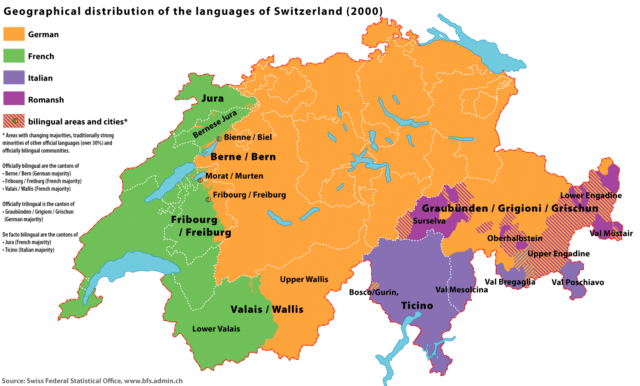Swiss Language | Swiss German
Do you know what the official language of Switzerland is? It is a tricky question, as there are 4: German, French, Italian and Rhaeto-Rumantsch. Given the small country, 4 official languages seem like a lot. However, the languages vary greatly in the number of speakers: Rhaeto-Rumantsch is spoken by only 0.5% in a few regions in eastern Switzerland, Italian by 6.5% mainly south of the Alps, and French by 20.4% in the western part of the country. That makes German with 63.7% by far the most widely spoken language in Switzerland. Yet this is not exactly correct: While German is used as the official written language the spoken language differs a lot from German. This article examines the peculiarities of Swiss German and its difference to German.
Swiss Language | Alemannic Dialect
 Linguistically, Swiss German belongs to the Alemannic dialect together with the dialects of southwestern Germany and the German dialect in the Alsace-Region in France. This common origin is a result of descendants of the Germanic tribe Alemannen, which settled in southwestern Germany and spread to Alsace and Switzerland. Nevertheless, there is no uniform Swiss German dialect – rather every canton (comparable to states in the US) has its own dialect. While Swiss Germans typically understand the different dialects, the Germans have a hard time to do so. Keep reading and you’ll see why.
Linguistically, Swiss German belongs to the Alemannic dialect together with the dialects of southwestern Germany and the German dialect in the Alsace-Region in France. This common origin is a result of descendants of the Germanic tribe Alemannen, which settled in southwestern Germany and spread to Alsace and Switzerland. Nevertheless, there is no uniform Swiss German dialect – rather every canton (comparable to states in the US) has its own dialect. While Swiss Germans typically understand the different dialects, the Germans have a hard time to do so. Keep reading and you’ll see why.
Swiss German differs from German in phonology, orthography, grammar and vocabulary. The following sentence illustrates the different orthography.
Das Kind freut sich auf das Straßenfest. (German)
Ds Chind fröit sech uf ds Strassefescht. (Swiss German)
The child looks forward to the street party.
Guten Tag, kann ich Ihnen behilflich sein? (German)
Grüessech, chani öich behiuflech si? (Swiss German)
Good day, may I help you?
Swiss Language | German and Swiss German
With regards to grammar there are many differences between the two languages. Most importantly, there is no simple past in Swiss German. When referring to the past, Swiss Germans only use perfect tense. Another difference is the absence of the genitive case in Swiss German. However, a conclusion that Swiss German is less complicated than German would be premature. For instance, depending on the article (masculine, feminine, neuter), counting may change in Swiss German. Bernese Swiss dialect, for example, counts zwo froue (two women), zwe manne (two men), zwöi chind (two children). In German, by contrast, the number (zwei) does not change. Other differences apply with regards to gender articles for certain words. E-mail, for example, is neuter in Swiss German (das E-Mail), while it is feminine in German (die E-Mail). There are more grammatical peculiarities in Swiss German. However, let’s take a look at the vocabulary.
Swiss Language | French and Swiss German

| English | French | Swiss German | German |
| sidewalk | trottoir | Trottoir | Gehsteig |
| ticket | billet | Billet | Fahrschein |
| Hospital | Hospital | Spital | Krankenhaus |
| bicycle | velo | Velo | Fahrrad |
| Purse | portemonnaie | Portemonnaie | Geldbeutel |
| I am cold | J’ai froid | I ha chaut | Mir ist kalt |
(literally I have cold) (literally I have cold) (literally I am cold)
The following sentence further illustrates how different German and Swiss German may be. The dialect below is Bernese Swiss German:
Heute Abend gehe ich Butter und Kartoffelpuree einkaufen. (German)
Hinech gani Ankä und Härdöpfustock ga kömerle. (Swiss German)
Tonight I will go buy butter and mashed potatoes.
English and Swiss German
Another peculiarity of Swiss German is the frequent use of the suffix –li as an ending of nouns. This diminutive form is used to indicate smallness. Etymologically, -li is related to the English word little, which has not survived in German except for this suffix in Alemannic dialects. For example instead of Zug (train), Zügli is often used instead (meaning little train).
In addition to this English suffix, Swiss Germans have also adopted some English words – and have slightly modified them:
| English root | Swiss German |
| board | boardä (to snowboard) |
| game | gamä (to play a computer game) |
| food | foodä (slang for to eat) |
| shoot | tschutte (to play football) |
| googlä (to look something up on Google) |
While in other countries it is considered somewhat uncultured to use dialect, Swiss Germans are very proud of their regional dialects. In fact, it is used as a spoken language in practically all situations of daily life. Standard German is normally used only for written language and for the national broadcast news. Yet many Swiss also write in Swiss German to each other, spelling the words the way they pronounce them. But there is no official Swiss German written language.
Here is the bottom line: Even though German is one of the four official languages of Switzerland, for Swiss Germans it is not their mother tongue in a strict sense, as they have to learn how to use it once they start school and as they do not (orally) communicate in German with each other.
If you kept reading until here, you’ll get rewarded at this point – we tell you how you can win the heart of a Swiss! Try to speak the most awkwardly sounding word in Swiss German: Chuchichäschtli (it means ‘kitchen cupboard’). They will love you, no matter how weird it sounds.
Let us know if you need German interpreting services!
About Language Connections:
Language Connections is one of the top language service companies in the US. Over the last 30 years, we’ve focused on providing the best business translation services, interpreting services, as well as interpreter training and customized language training programs. In addition to top-tier corporate language training, we offer certified corporate interpreters and professional business translation services in 200+ languages. Our network includes linguists with backgrounds in all major industries. They’re ready to meet your needs, whether they’re for technical translation services, legal translation, government translation services, international development translation services, education translation services, life sciences translation, or something else. Reach out to us today for a free quote on our cost-efficient and timely translation services, interpreters, or other linguistic services.
Language Connections Inc.
2001 Beacon Street, Suite 105,
Boston, MA 02135
Phone: +1-617-731-3510
Email: service@languageconnections.com


